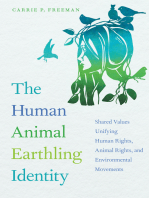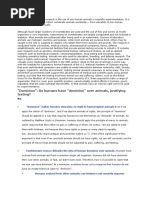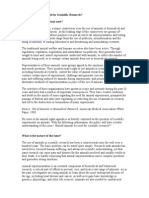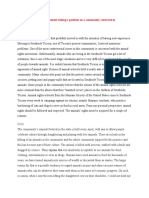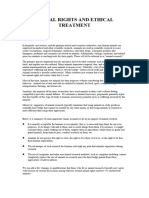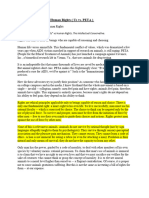Ca214 Kaizen
Ca214 Kaizen
Uploaded by
Soleil AcademiáCopyright:
Available Formats
Ca214 Kaizen
Ca214 Kaizen
Uploaded by
Soleil AcademiáOriginal Title
Copyright
Available Formats
Share this document
Did you find this document useful?
Is this content inappropriate?
Copyright:
Available Formats
Ca214 Kaizen
Ca214 Kaizen
Uploaded by
Soleil AcademiáCopyright:
Available Formats
Animal Rights
Advocacy Campaign
Animal rights are moral principles grounded in the belief that non-human animals
should have the ability to live as they wish, without being subjected to the desires of
human beings. At the core of animal rights is autonomy, which is another way of saying
choice. In many countries, human rights are enshrined to protect certain freedoms, such
as the right to expression, freedom from torture, and access to democracy. Of course,
these choices might be constrained depending on social locations like race, class, and
gender, but generally speaking, human rights should safeguard the basic tenets of
what makes human lives worth living. Animal rights must aim to do something similar,
only for non-human animals.
Animal rights advocates believe that non-human animals should be free to live as they
wish, without being used, exploited, or otherwise interfered with by humans
"animal rights" refers to the idea that many animals must have fundamental rights to be
treated with respect as individuals-rights to life, liberty, and freedom from torture that
may not be overridden by considerations of aggregate welfare.
1. Advocacy and Awareness Campaigns: Educating the public about animal
welfare issues through social media, events, and literature could help raise
awareness.
2. Legislative Work: Supporting and promoting laws and policies that protect
animals, such as anti-cruelty statutes or bans on certain animal testing practices
might lead to more protections.
3. Rescue and Rehabilitation: Saving animals from abuse or neglect and
providing medical care and shelter can improve their lives significantly.
4. Ethical Consumerism: Choosing products that do not exploit animals, such as
cruelty-free co-metics or plant-based alternatives should become a more
common practice
5. Volunteering: Helping at animal shelters or sanctuaries to care for and find
homes for animals in need could make a big difference in their well-being
6. Research and Education: Conducting studies on animal welfare and teaching
others about the importance of humane treatment of animals may encourage
more people to act ethically.
These Activities aim to improve the well being of animals and ensure their rights
are respected
The Philippine Animal Welfare Society (PAWS) organizations aims to promote the
welfare and protection of animals in the Philippines. Their mission includes rescuing
animals from abuse and neglect, providing medical care, and advocating for animal
rights through education and legislation.
Animal rights organizations work to protect animals from cruelty and exploitation. PETA
(People for the Ethical Treatment of Animals) focuses on ending animal abuse through
campaigns and public education. The Humane Society International works globally to
rescue animals from cruelty and promote animal welfare legislation.
The ASPCA (American Society for the Prevention of Cruelty to Animals) provides rescue
and support services while advocating for stronger animal protection laws. Another
prominent group, Animal Equality, aims to reduce animal suffering through investigative
work and legal reforms.
Animal Welfare must be concerned with the situation of every animals, for any
concerns you may contact:
Humane Society of the United States: 202-452-1100
Philippine Animal Welfare Society (PAWS) at 475-1688
People for the Ethical Treatment of Animals: 1-757-622-7382
RSPCA (Royal Society for the Prevention of Cruelty to Animals): 0300 123 4999
Cebu City Animal Control Office at +63 32 255 2262
Manila Veterinary Inspection Board for animal welfare issues. Their contact number is
+63 2 527 3798
You might also like
- ROLLIN, Bernard - Animal Rights & Human MoralityDocument517 pagesROLLIN, Bernard - Animal Rights & Human MoralityFrancisco Javier Salazar VelásquezNo ratings yet
- Concept Paper in IctDocument11 pagesConcept Paper in IctNicole Ashley Cruz85% (27)
- The Human Animal Earthling Identity: Shared Values Unifying Human Rights, Animal Rights, and Environmental MovementsFrom EverandThe Human Animal Earthling Identity: Shared Values Unifying Human Rights, Animal Rights, and Environmental MovementsNo ratings yet
- Animal RightsDocument13 pagesAnimal Rights6w5n9bjzzbNo ratings yet
- Rights Welfare LibDocument1 pageRights Welfare LibNina SapphireNo ratings yet
- On Animal Rights: To Be Pass To: Joselito TolentinoDocument7 pagesOn Animal Rights: To Be Pass To: Joselito Tolentinoイヴ・ アケル・ タヨNo ratings yet
- The Ethical Imperative of Animal RightsDocument1 pageThe Ethical Imperative of Animal RightskyetsukunNo ratings yet
- Animal RightsDocument4 pagesAnimal RightsANGELICA FHEB PONo ratings yet
- Engl1511 Annbib AnimalrightsarticleDocument6 pagesEngl1511 Annbib Animalrightsarticleapi-232646655No ratings yet
- Animal Right Vs Animal WelfareDocument2 pagesAnimal Right Vs Animal WelfareShreeshSwarajNo ratings yet
- Animal Testing or Animal Research Is The Use of NonDocument4 pagesAnimal Testing or Animal Research Is The Use of Nonalexis_hoNo ratings yet
- Should Animals Be Used For Scientific ResearchDocument8 pagesShould Animals Be Used For Scientific ResearchNajah HalidNo ratings yet
- Henciekhiel Briones ADDocument65 pagesHenciekhiel Briones ADMeynard MagsinoNo ratings yet
- Animal Rights Vs Animal WelfareDocument18 pagesAnimal Rights Vs Animal WelfarePhước An UwUNo ratings yet
- Astrid ResearchDocument3 pagesAstrid ResearchKimberly Grace MontemayorNo ratings yet
- What Is Animals Right All AboutDocument8 pagesWhat Is Animals Right All AboutwriterseinnaaaoNo ratings yet
- Animal Rights ProDocument3 pagesAnimal Rights ProAnastasia StoicaNo ratings yet
- AdvocacyDocument1 pageAdvocacyJustin DugangNo ratings yet
- On Animal Rights AdvocacyDocument20 pagesOn Animal Rights AdvocacyChristina CompasionNo ratings yet
- CASE STUDY MiceDocument7 pagesCASE STUDY MiceCHA RLESNo ratings yet
- Animal Rights and ProtectionDocument3 pagesAnimal Rights and Protection122809No ratings yet
- Group 4 - Animal RightsDocument16 pagesGroup 4 - Animal RightsElaina JoyNo ratings yet
- Group 4 - Animal RightsDocument16 pagesGroup 4 - Animal RightsElaina JoyNo ratings yet
- Animal TestingDocument1 pageAnimal TestingTaty Cerrato de JorqueraNo ratings yet
- Group-1 Stem26 MapagmatyagDocument19 pagesGroup-1 Stem26 MapagmatyagkitempyyNo ratings yet
- Sarvarayudu Ambati, 2016088: International Environmentallaws Project byDocument12 pagesSarvarayudu Ambati, 2016088: International Environmentallaws Project bySuguna GuntreddiNo ratings yet
- 3rd Oral Exam Should Animals Have Rights?Document1 page3rd Oral Exam Should Animals Have Rights?Bryan SilvaNo ratings yet
- This House Believes That Animal Have Rights (+) Affirmative Team - Animal Rights Is Fundamental Principle About Moral and Legal Right ReasonDocument3 pagesThis House Believes That Animal Have Rights (+) Affirmative Team - Animal Rights Is Fundamental Principle About Moral and Legal Right ReasonRosi ArristaNo ratings yet
- Essay 3: Documented Argument-Taking A Position On A Community Controversy Animal RightsDocument4 pagesEssay 3: Documented Argument-Taking A Position On A Community Controversy Animal RightsKim NguyenNo ratings yet
- Term PaperDocument4 pagesTerm PapertrixieviaeigengirlNo ratings yet
- Animals Should Have The Same Rights As Humans-Group 9Document2 pagesAnimals Should Have The Same Rights As Humans-Group 9Rywng MulidiNo ratings yet
- Moral and Ethical Considerations For The Use of AnimalsDocument9 pagesMoral and Ethical Considerations For The Use of AnimalsDr Dart05No ratings yet
- Animal Welfare, Animal RightsDocument8 pagesAnimal Welfare, Animal RightsDevynNo ratings yet
- Animal Ethics PPT ReportDocument18 pagesAnimal Ethics PPT ReportCatherine IglesiasNo ratings yet
- Animal RightsDocument4 pagesAnimal Rightsgrafei pennaNo ratings yet
- Animal Cruelty and Rights Review and Recommendations - Navya Jain Muskan JainDocument37 pagesAnimal Cruelty and Rights Review and Recommendations - Navya Jain Muskan Jainbaina4691No ratings yet
- Viewpoint Synthesis Outline 1Document14 pagesViewpoint Synthesis Outline 1api-495027984No ratings yet
- Animal Welfare EthicsDocument1 pageAnimal Welfare EthicsSidNo ratings yet
- CSR Assignment - Animal WelfareDocument15 pagesCSR Assignment - Animal WelfareVarun SagarNo ratings yet
- Violence or Abuse Committed Against AnimalsDocument1 pageViolence or Abuse Committed Against AnimalsHennessy Shania Gallera ArdienteNo ratings yet
- Logical Argument: Christopher Hutson Composition II Gail RichardDocument4 pagesLogical Argument: Christopher Hutson Composition II Gail Richardapi-302072203No ratings yet
- EssayDocument1 pageEssayAshima SoodNo ratings yet
- EssaDocument1 pageEssaAshima SoodNo ratings yet
- Law Schools of CanadaDocument1 pageLaw Schools of CanadaAshima SoodNo ratings yet
- Why Do People Abuse Animals?, Does The Society Do Something About It?Document2 pagesWhy Do People Abuse Animals?, Does The Society Do Something About It?Debbie Overby BudathNo ratings yet
- S.1.T.1 Obligations When You Own A Pet Animal CrueltyDocument48 pagesS.1.T.1 Obligations When You Own A Pet Animal CrueltyLuis Castro ONo ratings yet
- Animal RightsDocument3 pagesAnimal RightsGema Del Campo MontoyaNo ratings yet
- Tan SibeiDocument13 pagesTan Sibeiapi-271611604No ratings yet
- Animal WelfareDocument10 pagesAnimal WelfareAparna ViswanathNo ratings yet
- Edwin LockeDocument4 pagesEdwin Locke6ynkzmmcfvNo ratings yet
- Animal Rights Vs Animal WelfareDocument15 pagesAnimal Rights Vs Animal WelfarevetmuhammadbilalNo ratings yet
- Animal Rights Versus Animal WelfareDocument6 pagesAnimal Rights Versus Animal Welfareapi-355447761No ratings yet
- Animal Rights: "The Worst Sin Towards Our Fellow Creatures Is Not To Hate Them, But ToDocument22 pagesAnimal Rights: "The Worst Sin Towards Our Fellow Creatures Is Not To Hate Them, But ToHaleema SultanNo ratings yet
- Exploding the Myths: Mammal Welfare, Handling and TeachingFrom EverandExploding the Myths: Mammal Welfare, Handling and TeachingNo ratings yet
- The Animal Rights Debate: Abolition or Regulation?From EverandThe Animal Rights Debate: Abolition or Regulation?Rating: 4.5 out of 5 stars4.5/5 (3)
- Ca213 SheenaDocument3 pagesCa213 SheenaSoleil AcademiáNo ratings yet
- Ca212 LheanneDocument1 pageCa212 LheanneSoleil AcademiáNo ratings yet
- Ca109 BruselasDocument8 pagesCa109 BruselasSoleil AcademiáNo ratings yet
- Ca30 AlcaldeDocument3 pagesCa30 AlcaldeSoleil AcademiáNo ratings yet
- CMR Week 1 & 2 Theories CMRDocument33 pagesCMR Week 1 & 2 Theories CMRMohd AzrinNo ratings yet
- Wirtten Laws (Miscellaneous Amendment) Act No. 3 of 2021 PDFDocument36 pagesWirtten Laws (Miscellaneous Amendment) Act No. 3 of 2021 PDFAlex MashakaNo ratings yet
- Has Devolution Worked Essay Collection FINALDocument180 pagesHas Devolution Worked Essay Collection FINALBdu MV100% (1)
- Shubhra RanjanDocument2 pagesShubhra RanjanAkshatNo ratings yet
- Golden Farms Inc. Vs Secretary of LaborDocument2 pagesGolden Farms Inc. Vs Secretary of LaborJanno Sangalang100% (1)
- Investiture 19 AlevelDocument7 pagesInvestiture 19 AlevelZil-E- Zahra - 41902/TCHR/BATDNo ratings yet
- Code of Ethics of The Philippine Medical Association: Article 1 General PrinciplesDocument3 pagesCode of Ethics of The Philippine Medical Association: Article 1 General PrinciplesDeepbluexNo ratings yet
- Legal Notice Number 78 of 28TH April 2020Document4 pagesLegal Notice Number 78 of 28TH April 2020niket.skysailinnovationNo ratings yet
- Title: Adolf Hitler: Name: Ahmad RazaDocument14 pagesTitle: Adolf Hitler: Name: Ahmad RazaAhmad RazaNo ratings yet
- Amway Direct Retailer/Seller Application: Personal DetailsDocument4 pagesAmway Direct Retailer/Seller Application: Personal DetailsBlest Cam PrajyotNo ratings yet
- Bank Guarantee SampleDocument2 pagesBank Guarantee SampleSergio BrokNo ratings yet
- Atestat 2008: TH TH THDocument2 pagesAtestat 2008: TH TH THAlexandra CismasNo ratings yet
- The - Centennial - of - Cacique - Democracy (2014) PDFDocument14 pagesThe - Centennial - of - Cacique - Democracy (2014) PDFjoachimjackNo ratings yet
- Rizals Exile Trial DeathDocument7 pagesRizals Exile Trial DeathStanley Salonga EbueNo ratings yet
- REAA - CPPREP4004 - Personal Profile Template v1.1Document4 pagesREAA - CPPREP4004 - Personal Profile Template v1.1Michael ChanNo ratings yet
- Rohinton Fali Nariman, Aniruddha Bose and V. Ramasubramanian, JJDocument52 pagesRohinton Fali Nariman, Aniruddha Bose and V. Ramasubramanian, JJApoorvnujsNo ratings yet
- Jadual Pencerapan Guru SKJ 2022Document1 pageJadual Pencerapan Guru SKJ 2022Nor AznidaNo ratings yet
- Don Jon PhilosophyDocument5 pagesDon Jon PhilosophyjoeNo ratings yet
- Unit 25 - Produce Minutes of Meetings - Assessment Questions NSDocument3 pagesUnit 25 - Produce Minutes of Meetings - Assessment Questions NSNaveenaNo ratings yet
- Criminal Procedure Module OutlineDocument19 pagesCriminal Procedure Module Outlinegeorgemagaya08No ratings yet
- Q2 General Mathematics 11 - Module 2Document25 pagesQ2 General Mathematics 11 - Module 2Noe GayosoNo ratings yet
- SeparationDocument39 pagesSeparationHarsh GargNo ratings yet
- 11.annexure 2 - HBA Application FormDocument2 pages11.annexure 2 - HBA Application FormSubodh GhuleNo ratings yet
- Scheme/CommittedDocument2 pagesScheme/CommittedShreyash JobworkNo ratings yet
- CredTrans Collated Digests 28-32 - Warehouse ReceiptsDocument4 pagesCredTrans Collated Digests 28-32 - Warehouse Receiptsyeusoff haydn jaafarNo ratings yet
- Notes Receivable DiscountingDocument33 pagesNotes Receivable DiscountingKristia AnagapNo ratings yet
- The Significance of Settling The Past of The December 12 Coup and The May 18 Gwangju UprisingDocument27 pagesThe Significance of Settling The Past of The December 12 Coup and The May 18 Gwangju UprisingBilly BuldNo ratings yet
- The Mysterious Study of Doctor Sex Tamsyn Muir Full Chapter Instant DownloadDocument32 pagesThe Mysterious Study of Doctor Sex Tamsyn Muir Full Chapter Instant DownloadtrevoycindieNo ratings yet
- Marpol Annex 6 Reg 18 FUEL OIL AVAILABILITYDocument4 pagesMarpol Annex 6 Reg 18 FUEL OIL AVAILABILITYZeki OzdenNo ratings yet
- Approaches To Industrial RelationDocument12 pagesApproaches To Industrial RelationPraween Anselm LakraNo ratings yet


